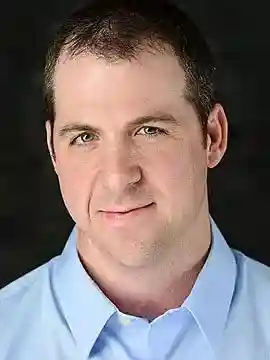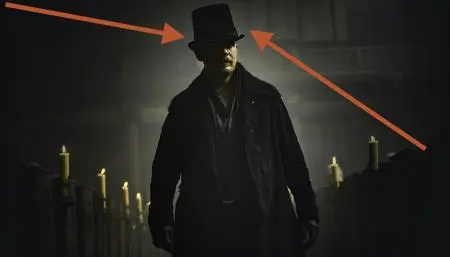Late in the series run of FX's Taboo, James Delaney leans in and warns a character: "You can leave right now, or you can stay here for the violence yet to come."
There is no better description for the rather unimpressive Taboo pilot. It's an unimpressive placeholder of a TV episode, but there's a reason I watched the entire season—because I was afraid that if I didn't watch, Tom Hardy would find me.
And I didn't want to miss the violence yet to come.
As a disclaimer, let me note that I did, indeed, watch the entire season, and as a complete season, I adore and recommend this show. I don't want this column to put anyone off of checking this thing out—it's wonderfully weird, lovingly executed, and the less it makes sense, the more fun it gets.
CHARISMA CARRIES THE DAY
Whether or not you like Taboo's central conceit, the fact is we're watching one of our finest actors in a passion project over the course of eight episodes.
Clearly, Tom Hardy is into this. His brooding is well-documented, but here it's less of a trope and more of a calculated bit of measured performance. The silence and growling and glaring are required to punctuate the glorious bouts of venom and violence. Tom can't stay turnt up all the time; otherwise, he's just a Pacino caricature eating the shit out of the scenery. So instead we get a buffet of Tom Hardy's range.
Early in the pilot, he's silent, brooding into the fire, processing what's behind him and ahead of him as his loyal butler asks, "Is that grief, James?" No one's sure—especially not James Delaney.
Later, he's telling the madame of a whorehouse that he'll send her henchmen's balls back to her in a little bag (and he takes the time to count the balls for her). No one needs to ask "Is that smoldering anger finally erupting, James?"
And let's be honest. We're all sticking around for those eruptions. We want the good shit, when all these haphazardly laid conflicts are going to break apart, and James Delaney is just going to have to outsmart and kill a lot of people in short order.
The episode's quality is more about what we can expect than what the pilot provides. Much like a great chef can improve a shitty recipe, a magnificent performance can hold together an otherwise imperfect show. I don't think I'm alone when I say that if a Hemsworth brother were the star of Taboo, I would have abandoned ship early.
LACK OF CHANGE, LACK OF PACE
The best storytelling typically tracks a character's arc. He or she changes over the course of the events of the story. Television is a challenge because there are multiple arcs for the same character, depending on the length and popularity of the series. Secondary characters have their own arcs to manage, so the best television is a delicate balancing act.
Now, I'm also a fan of arcs where the character resists change and ends up not changing. Taboo seems like one of these stories. James Delaney comes into the story fully-formed, complete with a shadowy backstory, some killer scars, and that dope-ass hat.
We spend an hour with him. He attends his father's funeral. He checks in on his illegitimate son. He talks to a lawyer and finds out he has the rights to MacGuffin Sound, I mean, Nootka Sound—a key piece of disputed land that is going to make him the target of both the East India Trading Company and the Crown.
James walks around London for the span of a day, reuniting with people from his past that gasp at his mere presence. He's got a father he doesn't love, a sister he wants to bang, a kid he doesn't want, and a butler to gives the writers a chance to dump exposition, hidden in Brace's creased and haggard face. The episode's capper is a confrontation with the East India and Stuart Strange, where James verbally outplays them, putting himself in their crosshairs.
And that's about it for the first hour. If there's an arc that gains momentum and drives us into the second episode, I'm not sure what it is—obviously we're supposed to climb aboard the "Delaney has the MacGuffin and he's in danger" train and chug along, but television is more complex nowadays.
Delany's motivations are unclear, and he spends the episode processing information instead of acting on it. At one point, after a mysterious vision, he says, "I have no fear, and I have no guilt for you." Which is fine, but guilt and fear are far more interesting, and he's got a lot more guilt and fear than he's letting on. It's as if the show is afraid to show any vulnerability, and it's a problem for his arc.
He broods like a boss, but the issue with brooding is that it's an inactive state.
THE JAMES DELANEY CHARACTER DEVELOPMENT RUMOR MILL
We can all agree that Mr. Delaney is at least interesting, no? Well, of course we can because everyone else on the show sure seems to think that way.
Delaney's backstory is a mystery. He disappeared for the better part of a decade after an East India slave ship sunk, and was wrapped in rumors of cannibalistic rituals, black magic, and his own death.
We see glimpses of a mysterious woman in the water, but other than that, the character development is achieved through almost comically on-the-nose reactions from other characters.
Example: when he enters his father's funeral, a bystander declares, "Dear God, there walks a dead man." Moments later, his sister doubles down: "They said you were dead."
"I am," he replies, which works only because it comes from the mouth of Tom Hardy.
Does this build mystery? Yes, so it has its place, but the outbursts are far too frequent to the point where they strain to develop the character.
If you're hoping you get to see this past in all its glory, I'm sad to report that it stays in the margins throughout the entire series run.
SAVE THE CAT!
One effective little bit that made me smile is a beat I learned in the great, Blake Snyder book entitled Save the Cat!
When I was younger, I learned a ton about decoding movies and identifying story beats in this book, and one of my favorites is the "Save the Cat" scene when the hero does something random and kind so that the audience will root for him or her right away.
James Delaney, being the dead, cannibalistic, hated, black magic-ing son of a bitch scoundrel that he is, is a candidate for at least a subtle wink to the audience that maybe he's not such an awful guy.
So within the first ten minutes, he takes the coins off of his dead father's eyelids. At first, we think that he is stealing them, establishing the depravity of his character, but moments later, he deposits them in the church offering box.
Sure, Delaney doesn't have a heart of gold, but it isn't the black organ that everyone makes it out to be, so that's effective storytelling that requires no dialogue and says volumes without saying a word.
![]()
image
FINAL THOUGHTS
I didn't talk enough about the setting, which is stupendous. Style and charisma are the soul of the show and carry it across the finish line in grand fashion.
I also haven't mentioned the hat nearly enough. The hat is awesome, and I want to pair it with The Young Pope papal hooded sweatshirt to complete the prestige TV fashionista look.
So if you're using Taboo to fuel your storytelling, consider these dos and don'ts.
Do: find ways to evolve your character over the course of the pilot. The heavy lifting of a pilot episode is to introduce a "normal" world for the character, and then destroy that normal world. The subsequent response from the character sets the stage for the season (and changes, so many changes) to come. Think Walter White, not James Delaney.
Don't: have an hour of television where barely anything significant happens (going back to the last column, FIRE YOUR GUNS!). Don't develop your character with other characters telling the audience what a mysterious badass your main character is—let us figure it out ourselves.
I give this pilot fifteen whore henchman ballsacks out of a possible twenty-four.

About the author
Fred Venturini grew up in Patoka, Illinois. His short fiction has been published in the Booked Anthology, Noir at the Bar 2, and Surreal South '13. In 2014, his story "Gasoline" is featured in Chuck Palahniuk's Burnt Tongues collection. The Heart Does Not Grow Back, published by Picador in 2014, is his first novel. He lives in Southern Illinois with his wife and daughter.









